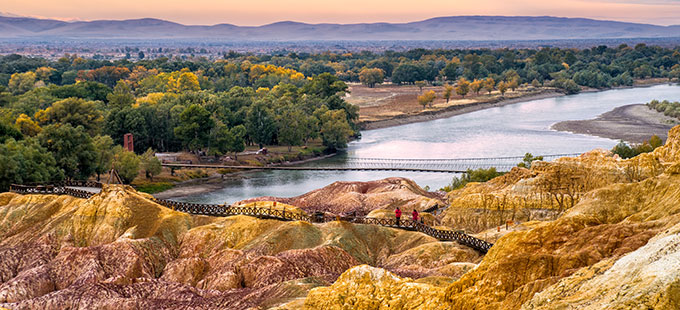


Xinjiang is China's largest autonomous region, encompassing an area of 635,870 sq mi (1,646,900 sq km). Located in the northwest of the country, Xinjiang is a sparsely populated area surrounded by rugged mountain ranges and featuring much desert terrain. The region is known for the "Rainbow Beach," seen here, on the Irtysh River in Burqin county in the north. In recent years, migration to Xinjiang has increased due to the construction of a railroad and oil and natural-gas pipelines. The influx has increased tensions among the numerous ethnic groups that populate the area. In the early 2000s, a government crackdown on Uighur separatists fueled deadly confrontations between protesters and Chinese security forces.
The Chinese are generally noted for hospitality and reserve. Confucianism, the ancient philosophy of social order, influences attitudes and encourages a group consciousness—especially in rural areas. Most Chinese are very proud of their nation's long history and of past Chinese achievements. They do not appreciate external criticism. The attitudes of people in larger eastern cities tend to be more cosmopolitan than those in the more traditional rural areas.
The central government emphasizes respect for and obedience to authority. Over time, people have lost respect for some local and national leaders. The change is slowly forcing local officials to be more accountable.
The principle of guanxi commits friends and associates to do what they can for each other when called upon. To violate guanxi is to lose reputation or honor. Children are expected to uphold the family's social standing. This has had different meanings in different eras. For today's urban children, it means being well educated and well dressed, earning money, and practicing traditional values such as loyalty and kindness. For rural Chinese, it means putting the needs of the group (family, community) above oneself. An admired person is one who brings the greatest honor to the family while being the most humble about personal accomplishments.
As more urban Chinese are becoming wealthy in an expanding economy, the gap between rich and poor is growing. Some areas are experiencing unrest because people are losing their jobs and the traditional cradle-to-grave benefits of the danwei (work group) system. For the average person, having food, shelter, and clothing is more desirable and understandable than the relatively abstract concept of political freedom.
"China: General Attitudes." CultureGrams Online Edition, ProQuest, 2023, online.culturegrams.com/world/world_country_sections.php?cid=34&cn=China&sname=General_Attitudes&snid=6. Accessed 15 September 2023.


"Infographic of China." CultureGrams Online Edition, ProQuest, 2023, online.culturegrams.com/world/world_popup_infographic.php?scountryname=China&id=&refername=&type=World. Accessed 15 September 2023.